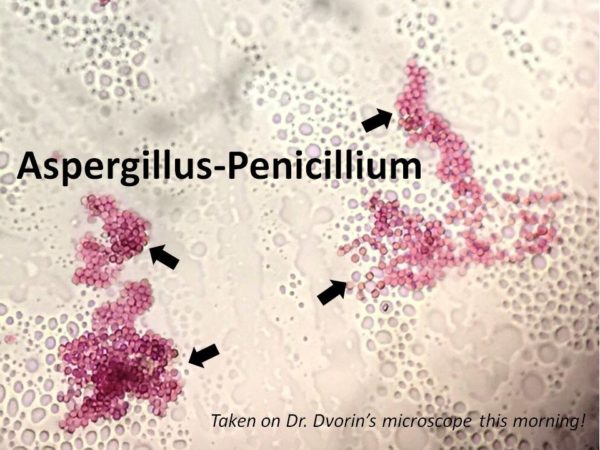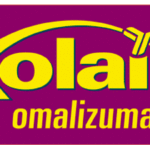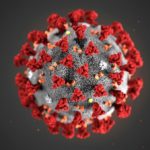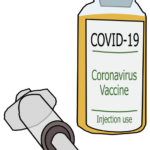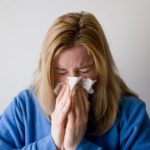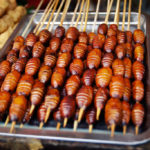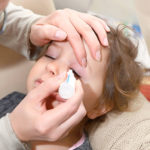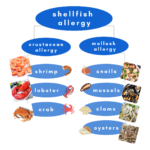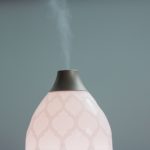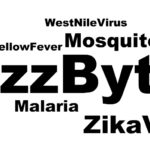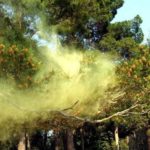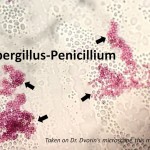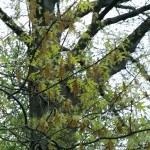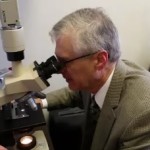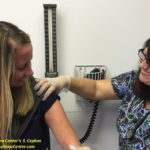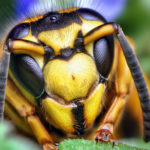allergies, allergy, allergy symptoms, Asthma, Dr. Donald Dvorin, english plantain, local pollen count, mold spores, outdoor mold, pollen count, published research, The Asthma Center
Tales from the Microscope: Unusual Mold Alert
For interviews and tours of the Delaware Valley’s only certified pollen and mold spore stations for the National Allergy Bureau (NAB) with stations, please email gwoodlyn@asthmacenter.com
“I see a few of these every day, but today’s aspergillus-penicillium is unusual which may be related to increased humidity in our region.”
That’s the word from Dr. Dvorin after counting today’s air sample. Typically, aspergillus-penicillium counts are under 100 mold spores per cubic meter of air/24 period. Today, aspergillus-penicillium counts are over 1400 mold spores per cubic meter of air/24 period.
Today’s count:
Tree pollen and grass pollen are moderate.
Weed pollen has increased and is high. English Plantain is the predominant weed pollen, and according to Dr. Dvorin, this plant is blooming all over our region.
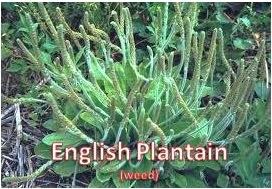
Outdoor Mold Spores are very high. In addition to the highly irregular concentration of aspergillus-penicillium molds, cladosporium molds are also at elevated levels.
Predominant: Outdoor Mold Spores & Weed Pollen
Mold Allergy
Too small to be seen by the naked eye, mold spores are all around us. While everyone breathes them, individuals with mold allergies may experience the typical symptoms of allergic rhinitis (allergies), also known as hay fever including itching, sneezing, and/or nasal congestion. Exposure to mold spores can also provoke flares of asthma. Chronic sinusitis is also sometimes related to mold spore exposure. Other less common reactions to mold spores include allergic bronchopulmonary aspergillosis (ABPA) and allergic fungal sinusitis (AFS.)
What is ABPA?
Allergic bronchopulmonary aspergillosis (ABPA) is an allergic reaction in the lung to Aspergillus fumigatus. Reactions to this fungus are rare in individuals with normal immune systems. Individuals with asthma or cystic fibrosis are among those most commonly affected by ABPA. If you have asthma, one of the first noticeable symptoms may be a progressive worsening of your asthma symptoms including coughing, wheezing, and shortness of breath. Other allergic conditions which may be present include nasal allergies (allergic rhinitis,) sinusitis, and skin allergies (atopic dermatitis/eczema and urticaria/hives.) Treatment usually includes oral corticosteroids and sometimes oral antifungal treatments. Individuals with ABPA are usually closely followed by their physician.
What is AFS?
Allergic fungal sinusitis is the most common fungal infection associated with chronic sinusitis. This condition often occurs in people with nasal polyps and sinus disease. It is usually resistant to conventional medical and surgical treatments. Tissue within the sinuses is often covered with characteristic thick gel-like discolored mucus filled with allergy cells (eosinophils). This gel is often described as “allergic mucin” and often contains fungal elements when properly stained and examined microscopically. Treatment of allergic fungal sinusitis includes surgery, oral and nasal corticosteroids, allergy injection therapy, leukotriene modifiers, antihistamines and oral decongestants. Unfortunately oral antifungal treatment is usually not effective.

The Asthma Center specialists have tremendous experience in evaluating and treating mold allergy including ABPA and AFS. Our physicians have contributed to published research in respected, peer-reviewed journals. This expertise combined with accurate air sample information allows The Asthma Center specialists to vigorously pursue the cause of an individual’s symptoms, develop a personal treatment plan, and provide comprehensive care in both common and unusual cases where mold allergy plays a role in allergy, sinus, and asthma symptoms.
Make an appointment to see an allergist – Why Choose Us?
The best way to fight your allergies is to visit a board certified allergist, learn what your allergies are, create a treatment plan, and adjust as needed. No two allergy sufferers are alike, so don’t rely on over the counter medications when you could be targeting your symptoms with the help of our allergy experts! At The Asthma Center, we know that no two individuals are alike, and our goal is to personalize your treatment to help you find relief. We accomplish this through identifying your allergies and specific levels of allergic sensitivity through allergy skin testing to help you plan your treatment. By following the local pollen counts, we are able to customize allergy regimens that prevent symptoms caused by taking too little, or too much allergy medication.
Did You Know – Pollen & Mold Spore Counts Direct to Your Inbox!
The Asthma Center’s daily Pollen and Mold Spore Count, the Delaware Valley’s only Official count station which is certified by the National Allergy Bureau are now available via email. Subscribe to receive our daily counts by email or check out some of our other blog posts to learn more about what is in the air, how it can affect you, and what you can do about it.
Recent
Popular

